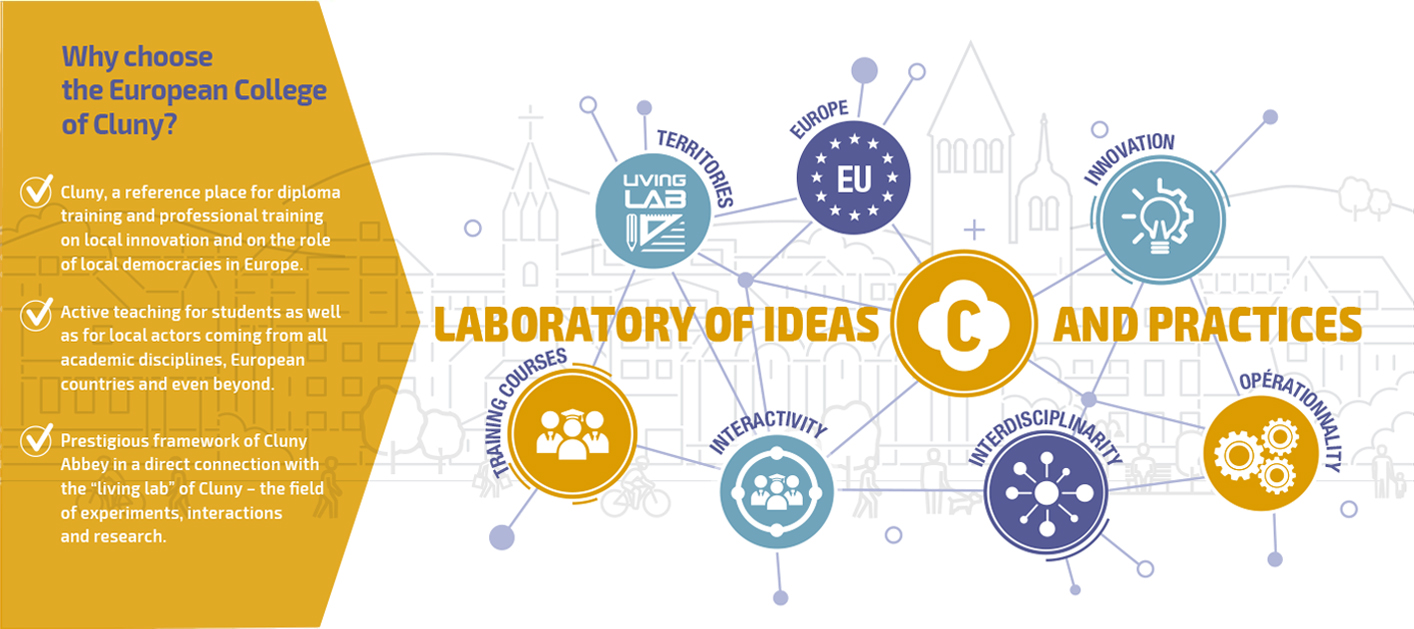
Professional Master (2nd level)
«Transitions and innovations in European territories:
environments and landscapes beyond the anthropocene »
If the construction of a sustainable collective future motivates you,
don’t hesitate to join us !
Our offer:
♦ Diploma course (courses starts autumn 2024):
⇒ Professional Master (2nd level) degree from the prestigious University of Bologna, the oldest university in Europe
⇒ Title of «Member of the European College of Cluny»
Training course including a period in Ravenna, and a period in Cluny + distance learning courses (provisional calendar to download HERE)Pre-registration is now open, so don’t wait any longer!
More information: contact@collegecluny.eu or at +33(0)03 85 59 53 60
Conceived jointly with the University of Bologna (Ravenna campus), the Professional Master (2nd level) “Transitions and innovations in territories in Europe: environments and landscapes beyond the anthropocene “ is a unique course. It offers its listeners the acquisition of skills and knowledge necessary for the conduct of territorial innovation projects in Europe, focusing on the “commons” and landscapes, in the context of the “anthropocene”:
- climate change
- collapse of biodiversity
- digital revolution
- demographic upheaval
- social exclusion
This course is intended for auditors originating from countries of the European Union and the neighborhood of the Union, with initial training at master’s level or equivalent professional experience, coming from various academic backgrounds (law, geography , town planning, architecture, engineering, digital sciences, management, public management, human and social sciences, political sciences, European affairs, educational sciences, languages, etc.).
The Professional Master cycle comprises modules combining formal teaching and operational applications, as well as tutored personal work for a total value of 60 ECTS.
At the end of the diploma course, holders of the Professional Master from the European College of Cluny are able to exercise professional responsibilities or an elective mandate in charge of territorial innovation project manager or to lead a research-action project on the innovative care of “commons” and landscapes in Europe, as well as the conduct of societal transformations
The title of “Member of the European College of Cluny”: After having followed the training, the “Members of the European College of Cluny” are committed to:
- actively participate in the European network of members of the Collège de Cluny, officials involved in transitions in Europe and its neighborhood,
- continuously update their knowledge and skills,
- share their knowledge with people wishing to learn how to manage transitions,
- act responsibly towards future generations.
Course calendar 2024-2025 under construction
♦ Lifelong learning:
⇒ Training modules can be taken independently of each other
Calendar for 2023-2024:
From november 2023: Master of advanced studies (MAS): «Transitions and innovations in European territories: environment and post-Anthropocene landscapes» – Syllabus download here:
For Cursus European College of Cluny, syllabus here soon
- Inaugural course and 1st teaching period at the University of Bologne, Ravenna campus
• Thinking together about the anthropocene (general introduction)
• Read the landscape
• Water, a common good
• Energy, climate: territorial management
• To welcome and incorporate
• Common goods management
- 2nd teaching period – Thematic modules, at the European College of Cluny
• Applied modern languages, introduction to the Cluny landscape (refresher course in French or English). Presentation of the actors, methods and networks of the European College of Cluny and discovery of its living lab
• Eat local
• Getting around «low carbon»
• (Re)living in existing building?
• To be protected and to protect, to be included and to include
• Circular economy: local timber example
• Living with the living
• Acting as a local, regional, national, European and global citizen
• Mobilizing the intelligence of a territory
• Connecting without excluding
• Introduction to geographic information systems
• Introduction to coding
• Public policy design
• Public services in Europe
- 3rd period: Professional immersion in territorial innovation project management:
4 months minimum between April and July, within a territorial authority, a company or an association, partner Second semestre
A formation between thematic seminars, cross-cutting courses and professional intervention within a company or a territorial community
